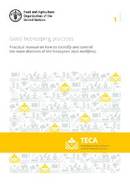Resources
YUNGA: THE POLLINATORS CHALLENGE BADGE
The POLLINATORS CHALLENGE BADGE is designed to help educate children and young people about the importance of pollinators for people and the planet, and how to help safeguard them against extinction. This material is appropriate for use in school classes, Guide or Scout groups or youth meetings generally. It includes a wide range of activities and ideas to stimulate learning about protecting pollinators.
The pollination services of forests
This infographic is based on a related publication to highlight the importance, at the forest and landscape scales, of employing pollination-friendly management practices.
It provided a visually easy-to-retain overview of the publication, with recommendation on measures for maintaining pollinator in forests and landscapes.
It aims at raising awareness among stakeholders about the benefits of pollinators and beneficial practices that help to enhance pollination services across agricultural sectors.
Working Together for Biodiversity: Tales from the All-Ireland Pollinator Plan 2015-2020
Author: All-Ireland Pollinator Plan
Working Together for Biodiversity, explores what has been achieved through the All-Ireland Pollinator Plan in its first five years.
Good beekeeping practices: Practical manual on how to identify and control the main diseases of the honeybee (Apis mellifera)
Author: FAO
This is a practical tool to help beekeepers, veterinarians and beekeeping advisory services to properly identify main honeybee diseases and to take the most appropriate actions in the apiary to control and/or prevent disease outbreaks. This publication follows the TECA publication Main bee diseases: good beekeeping practices (2018) which provided a more general overview of good beekeeping practices for bee diseases.
Towards sustainable crop pollination services
Author: FAO
As the discipline of pollination ecology moves from describing the extent of a pollinator crisis, to identifying what can be done about it, there is a need to share and highlight very practical measures that will support sustainable crop biotic pollination services. Identifying these practices will require a mix of farmer and natural historian knowledge and scientific research. In this publication, we will outline the practices that have been so far identified, and what experiences may contribute to sharing the effectiveness of these measures under different circumstances.






